- Last Updated: February 16th, 2026
Key Takeaways
Facebook and Instagram are being sued by users who claim that the platforms' algorithms harm young people's mental health, leading to addiction, body image issues, and depression.
To file a lawsuit against Facebook for mental health impacts, individuals should gather evidence, seek experienced lawyers in social media harm cases, and stay engaged throughout the legal process.
Meta faces serious liability concerns, with multiple lawsuits alleging their practices contribute to a range of mental health issues in young users, including self-harm and eating disorders.
Overview of the Facebook Mental Health Lawsuit
On this page, we’ll discuss what the Facebook mental health lawsuit is about, the current status of the Facebook mental health lawsuit, who qualifies to file a Facebook mental health lawsuit, and much more.
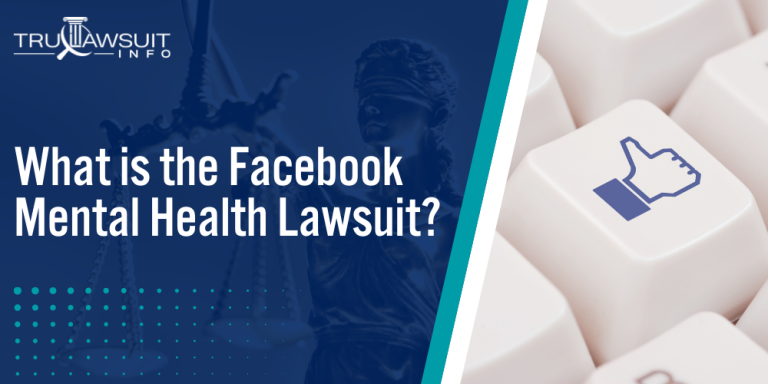
Intro To The Facebook Mental Health Lawsuit
Key aspects of the Facebook mental health lawsuit include, but are not limited to:
- Deceptive Practices Allegations: Lawsuits claim Meta deliberately made its platforms addictive, harming young users’ mental health.
- Effects on Youth: Allegations highlight social media’s negative impact on children and teens, linking features like “likes” and constant notifications to a youth mental health crisis.
- Legal Responses: 33 states and nine attorneys general have sued Meta for prioritizing profits over user safety, prompting discussions on new child protection laws.
- Multidistrict Litigation: Multiple lawsuits have merged into an MDL, with plaintiffs alleging Meta’s addictive design caused mental harm to minors.
If you or someone you love has struggled with mental health challenges related to Facebook, you may qualify to file a claim.
Contact TruLawsuit Info using the chat on this page to find out if you qualify to seek compensation in the Facebook mental health lawsuit today.
Documented Impact of Facebook on Teen Mental Health
The intersection of social media usage and teen mental health has become a focal point for research and legal scrutiny, with a multitude of studies linking platforms like Facebook to negative psychological outcomes in young people.
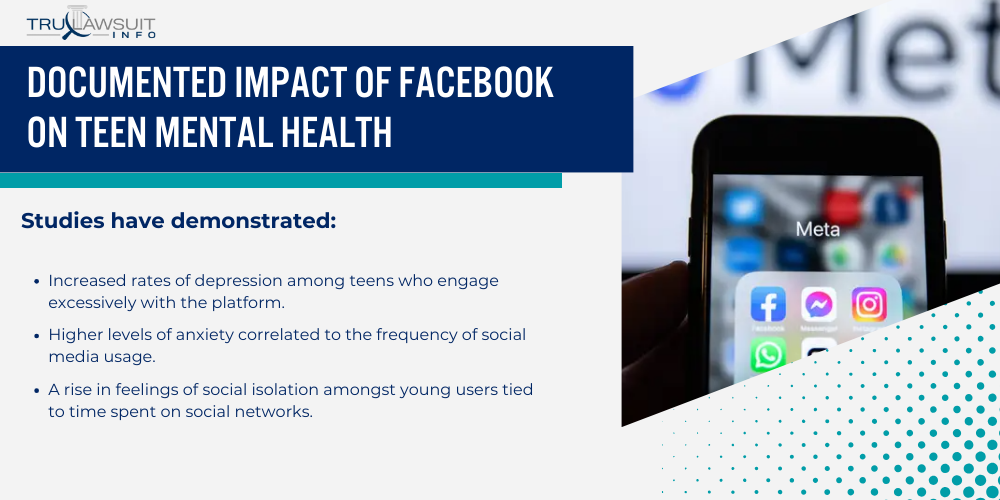
Evidence of Harm to Teen Mental Health
Facebook has been scrutinized for its potential impact on the mental health of its younger audience.
Studies have demonstrated:
- Increased rates of depression among teens who engage excessively with the platform.
- Higher levels of anxiety correlated to the frequency of social media usage.
- A rise in feelings of social isolation amongst young users tied to time spent on social networks.
- Adverse effects on self-esteem due to the curated and often unrealistic representations of other users’ lives.
The Attorney General James and Multistate Coalition have taken legal action based on such findings.
Societal Concerns of Youth Mental Health Crisis
Young people today are facing unprecedented challenges to their mental well-being.
From social media pressures to a constantly connected world, their developing minds are bombarded with information and experiences that can be overwhelming.
The broader societal implications of the youth mental health crisis are vast, with different stakeholders expressing grave concerns:
- The amplified spread of misleading information affects young people’s worldviews.
- Risks of cyberbullying leading to emotional distress.
- Correlation between heavy social media usage and sleep disturbances.
- Parental concerns over inadequate content moderation to protect children’s mental health.
The bipartisan coalition of attorneys general’s lawsuits highlight these societal challenges and stress the urgency of addressing the pervasive mental health crisis.
Role of School Districts and Parents
School districts and parents play a critical role in mitigating the effects of social media on teen girls and boys.
They focus on:
- Education about responsible social media usage in school curriculums.
- Initiatives to support children’s mental health resilience and coping strategies.
- Monitoring and dialogue about digital habits within the home environment.
- Collaboration in community efforts to tackle the teen mental health crisis.
This combined approach is essential in creating a support system for young people in addition to legal actions like those initiated by the California Attorney General Bonta.
Facebook’s Design Choices and Their Addictive Nature
Facebook has been scrutinized for its design elements that potentially foster social media addiction, particularly among teens.
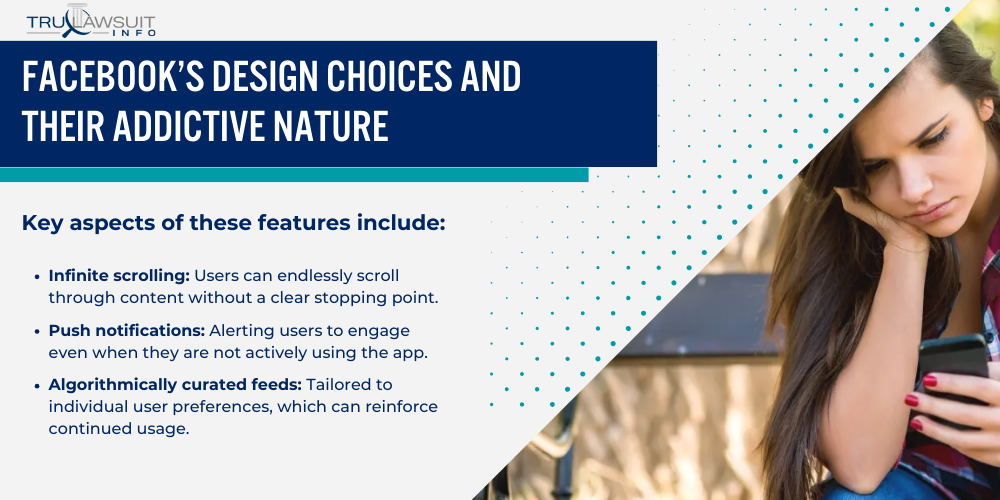
Let’s discuss how design and functionality contribute to excessive use, compare Facebook with other platforms, and address the need for age-appropriate standards in content regulation.
Design and Functionality Contributing to Addiction
Facebook, along with some other social media platforms, has implemented features that are designed to capture and retain user attention.
Key aspects of these features include:
- Infinite scrolling: Users can endlessly scroll through content without a clear stopping point.
- Push notifications: Alerting users to engage even when they are not actively using the app.
- Algorithmically curated feeds: Tailored to individual user preferences, which can reinforce continued usage.
- Personalized recommendations: Suggesting groups or pages based on user behavior, thus increasing time spent on the platform.
These functionalities keep users engaged, with corresponding implications for social media addiction.
Comparison with Other Social Media Platforms
Compared to other social media platforms, Facebook has often been at the forefront in terms of developing addictive features.
Here’s how it stacks up:
- Similarities: Like Facebook, many platforms use algorithms that prioritize content designed to keep users engaged longer.
- Differences: Many apps teens use may include more video and image-based content, which can be even more engaging due to their dynamic nature.
While practices largely overlap across platforms, the extent to which each contributes to excessive social media use varies.
Regulating Content and Creating Age-Appropriate Standards
The push for age-appropriate standards in content and usage arises from concerns over Facebook’s effect on young users.
Notable approaches include:
- Establishing clear guidelines: For content that is suitable for different age groups.
- Enhanced privacy settings: Limiting exposure to certain types of content and interactions.
- Usage controls: Providing tools that allow users to monitor and limit time spent on the apps.
- Education on digital literacy: Teaching young users about the risks of excessive social media use.
It is recognized that platforms must be proactive in addressing the potential for addiction, particularly as it concerns younger demographics.
Ethical Considerations of the Facebook Mental Health Lawsuit
The Facebook Mental Health Lawsuit has cast a spotlight on the urgent ethical issues surrounding social media’s impact on users, particularly the youth.
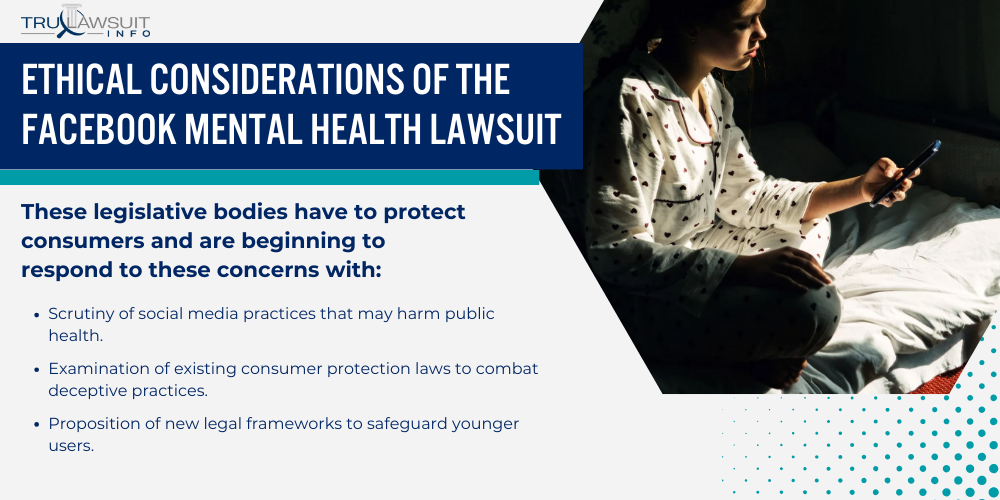
This scrutiny has ethical implications tied to legislation, consumer advocacy, and ongoing legal challenges.
Role of Federal and State Legislation
Federal and state legislation plays a pivotal role in addressing potential public health hazards posed by social media.
These legislative bodies have to protect consumers and are beginning to respond to these concerns with:
- Scrutiny of social media practices that may harm public health.
- Examination of existing consumer protection laws to combat deceptive practices.
- Proposition of new legal frameworks to safeguard younger users.
- Discussions on how to enhance accountability for social media companies.
Attorneys general from various states have initiated legal action, emphasizing the need for robust legal intervention to protect consumers.
For example, the California Attorney General has been a leading figure in the legal pursuit against Meta for its operating procedures.
Consumer Advocacy and Protection
Consumer advocacy groups have critiqued Meta for not doing enough to protect users, especially the younger demographic.
These organizations argue that:
- There should be clear warnings about the potential negative mental health impacts.
- Meta should implement more rigorous content moderation.
- Consumer protection protocols must be enforced more strictly.
- Social media platforms should be more transparent about their algorithms and data usage.
Protection of consumers’ well-being is paramount, and legal actions in federal court underscore this position.
For example, the Northern District of California has become a significant battleground for Facebook mental health lawsuits.
Ongoing Legal Actions against Tech Companies
The ethical implications of suing Meta over allegations of harm to youth mental health have highlighted the pattern of ongoing legal actions against tech companies.
Salient points to consider are:
- The consistency and merit of legal challenges over time.
- The role of the federal court system in adjudicating these cases.
- The power dynamics between large tech companies and individual consumer rights.
- The possible outcomes and precedents that these legal cases could establish.
The engagement of numerous attorneys general in the lawsuit signifies a collective response to protect the public interest.
Notably, the consolidation of these actions suggests a common recognition of possible unethical practices affecting mental health.
Future Implications of the Facebook Mental Health Lawsuit
The ongoing legal battle involving Meta over the negative mental health effects of their social media platforms on young users could set a precedent for how digital companies manage user experience and accountability.
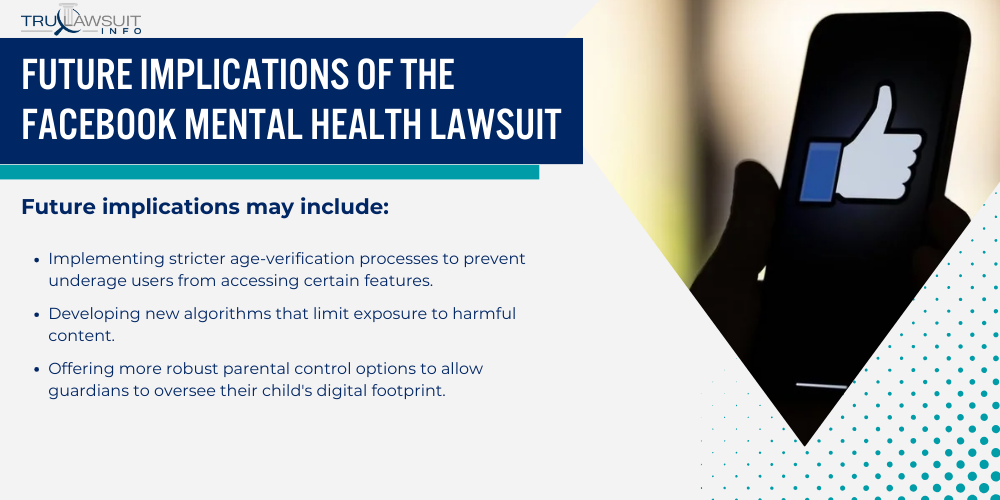
Creating a Safer Online World for Young Users
Digital platforms might be compelled to introduce new safety measures designed to protect young people online.
This could include:
- Implementing stricter age-verification processes to prevent underage users from accessing certain features.
- Developing new algorithms that limit exposure to harmful content.
- Offering more robust parental control options to allow guardians to oversee their child’s digital footprint.
- Conducting regular audits of platform effects on mental health to ensure a positive experience online.
Accountability and Corporate Responsibility
The lawsuit emphasizes the need for companies to be accountable for their impact on users’ well-being.
Potential outcomes may involve:
- Legislation requires companies to disclose internal research on how their platforms affect mental health.
- Greater scrutiny of features that are suspected to boost corporate profits at the expense of user safety.
- Corporate policy changes that prioritize mental health over user engagement metrics.
- Industry-wide standards to ensure all players in the social media space create clear and transparent policies on content and user interaction.
Support Systems and Resources for Affected Individuals
In the wake of concerns about the impact of social media on mental health, particularly among teens, Metas platforms have an opportunity to prioritize user well-being.
This could involve establishing dedicated help centers for users struggling with content and providing teens with access to mental health resources.
Metas may need to direct more resources into support systems:
- Establishment of dedicated help centers for users who may be affected by content on the platforms.
- Providing teens with access to mental health resources through collaborations with healthcare providers or non-profit organizations.
- Developing educational materials that help users understand the potential mental health risks of social media use.
- Creating pathways for external review of reported body image issues by mental health professionals
These changes, emanating from the lawsuit, could fundamentally alter how social media entities engage with their youngest user base.
They strive to ensure the protection of users and create a more transparent online space that supports healthy digital habits.
Frequently Asked Questions
-
Attorneys General from multiple states have taken legal action against Meta, Facebook’s parent company.
This litigation includes claims of deliberately addictive features on platforms such as Instagram.
For more details, readers can review the information laid out by Attorney General Kris Mayes.
-
The exact compensation figures in the lawsuit have not been disclosed publicly.
However, they are likely to be substantial owing to the severity of the allegations and the number of states involved.
-
The lawsuits claim that social media companies prioritize user engagement over user well-being, achieved through addictive algorithms and content, exacerbating mental health problems, particularly among young people.
For instance, the Attorney General of Oklahoma states similar grievances in the filing.
-
Individuals suffering from depression as a result of using Facebook can potentially pursue legal action.
Seeking the counsel of a legal expert is advisable to explore this option.
-
The lawsuits claim that Meta prioritizes user engagement over user well-being in its design choices, leading to mental health issues, especially among young people.
This is a bipartisan effort involving multiple states, including the Michigan Attorney General’s office.
-
While the core accusations against social media companies focus on their alleged negative impact on youth mental health, the lawsuits themselves may differ based on the specific laws of each state.
This can lead to variations in how Facebook mental health lawsuits are filed and argued, even though the underlying claims may be similar.

Attorney Jessie Paluch, founder of TruLawsuit Info, has over 25 years of experience as a personal injury and mass tort attorney, and previously worked as an international tax attorney at Deloitte. Jessie collaborates with attorneys nationwide — enabling her to share reliable, up-to-date legal information with our readers.
Legally Reviewed
This article has been written and reviewed for legal accuracy and clarity by the team of writers and legal experts at TruLawsuit Info and is as accurate as possible. This content should not be taken as legal advice from an attorney. If you would like to learn more about our owner and experienced injury lawyer, Jessie Paluch, you can do so here.
Fact-Checked
TruLawsuit Info does everything possible to make sure the information in this article is up to date and accurate. If you need specific legal advice about your case, contact our team by using the chat on the bottom of this page. This article should not be taken as advice from an attorney.
You can learn more about the Social Media Harm Lawsuit by visiting any of our pages listed below:
Here, at Tru Lawsuit Info, we’re committed to helping victims get the justice they deserve.
To do this, we actively work to connect them with attorneys who are experts in litigating cases similar to theirs.
Table of Contents
Tru Lawsuit Info is a reliable source of information about issues that may affect your health and safety, such as faulty products, data breaches, and environmental hazards.
Our team of experienced writers collaborates with medical professionals, lawyers, and advocates to produce informative articles, guides, and other resources that raise awareness of these topics.
Our thorough research provides consumers with access to reliable information and updates on lawsuits happening around the country. We also can connect consumers with attorneys if they need assistance.
Here, at Tru Lawsuit Info, we’re committed to helping victims get the justice they deserve.
To do this, we actively work to connect them with attorneys who are experts in litigating cases similar to theirs.
